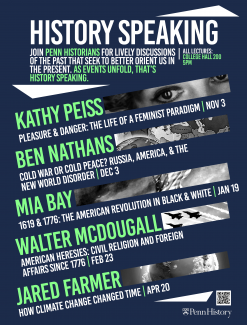
From the warming planet to the increasingly polarized electorate to the Jan. 6 attack on the U.S. Capitol, there is a tendency for hot topics and big news to be dubbed as “unprecedented,” with pundits and the public often pondering, “How did we get here?”
In this age of social change and global challenge, history can offer fresh perspectives, important distinctions, and even answers to that question. Starting Nov. 3 and continuing into the spring, faculty in the Department of History in Penn’s School of Arts & Sciences will present a series of in-person discussions of the past that seek to better orient attendees in the present.
“History Speaking” will feature five historians discussing their areas of expertise against the backdrop of current issues, perhaps showing things are not as unprecedented as they seem. First up will be Kathy Peiss on Nov. 3, speaking on “Pleasure and Danger: The Life of a Feminist Paradigm.”
“It occurred to some of us who are relatively newer to the History Department that this would be a great way to boost the department’s visibility and also a good service to perform for the broader community, especially given the velocity of change that we’re experiencing and the ways in which history can be clarifying for understanding the forces that are shaping the world we’re living in today,” says Brent Cebul, who helped organize the lectures. “You can’t understand the contemporary issues that we face as a country as a society and as humanity without thinking in historical ways.”
For each lecture, they chose contemporary topics with historical relevance, he says.
In December, Benjamin Nathans will address Russia-U.S. tensions in his talk, “Cold War or Cold Peace? Russia, America, & the New World Disorder”; Mia Bay will look at the controversies over The New York Times “1619 Project” in her January talk, “1619 and 1776: The American Revolution in Black and White”; Walter McDougall will discuss America’s shifting role in the world with his February lecture, “American Heresies: Civil Religion and Foreign Affairs Since 1776;” and wrapping up the series in April Jared Farmer will look at global warming in his talk, “How Climate Change Changed Time.”
“We could talk until we’re blue in the face about what might happen or what ought to happen, but the past is really the only source of accurate evidence about how things work and how we got to where we are,” Nathans says. “We wanted to act on that intuition and put together a series of talks that examine different topics, using the past to illuminate the present.”
The lectures are aimed at a broad audience, and organizers hope to attract, in addition to history students, other students, faculty, and staff around the Penn community and the general public as well.
“We’re really viewing this as a community gathering to think about the historical dimensions of these contemporary questions,” Cebul says.
Peiss, a renowned historian of gender, sexuality, and American social history, will offer a big picture analysis of where the feminist movement came from, where it is now, what’s at stake, and where it’s going.
“It seems really timely to discuss this topic, given how much controversy there is and how divided people are around a whole range of issues, from sexual harassment to gender-based violence to the #MeToo movement and what’s looking like the end of the constitutional right to an abortion,” Peiss says.
Her lecture will take listeners back to a 1982 feminist conference at Barnard that was intended to explore sexuality but was disrupted by anti-pornography and other protesters.
“I want to trace what happened to those themes of pleasure and danger over the last 40 years,” she says. “What feminists saw as pornography in 1982 looks very different in 2021. For instance, we don’t really have red light districts anymore, but we do have an internet- and media-saturated world with not only very sexually explicit material but also a sexualizing of the media in general.”
For historian Sarah Gronningsater, who was on the team that organized the lectures, part of the appeal of the series is a chance to bring the energy of the classroom into the broader community.
Read the entire story HERE
Information about the History Speaking Lecture Series HERE
